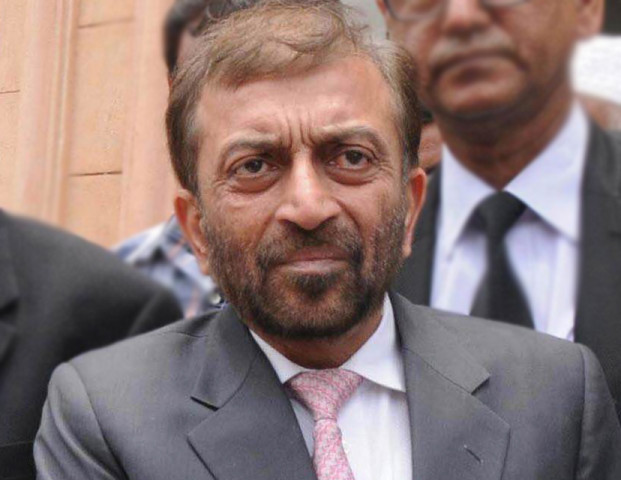Internal security: Policy a good step but devoid of substance, say experts
Speakers say main thrust of policy is on National Counter-Terrorism Authority which has remained a dormant body.

Muttahida Qaumi Movement MNA Farooq Sattar said the internal security is most crucial because even the country’s military admitted that the greatest threat to Pakistan is from within. PHOTO: EXPRESS/RASHID AJMERI
Much of it was the same old drill for which policies in Pakistan are notorious to fall short: how is this new policy going to be implemented? How will it be effective? Does it actually offer any solutions?
But as parliamentarians and security experts at a discussion on the “National Internal Security Policy (NISP)”, recently unveiled by the government, ripped into the document with their scrutiny and criticism, they also offered mild praise and some suggestions.

The discussion was organised Wednesday by the Pakistan Institute of Legislative Development and Transparency (PILDAT), with all the ‘Hows’ in mind and a ready analysis report it had commissioned journalist Saleem Safi to write.
They agreed the policy is a good beginning for a country that has never before had a document about domestic forms of militancy. But they mostly found the NISP confusing, unclear and devoid of substance when it comes to actual implementation.

The operational part of the policy, which the government has claimed will help dismantle domestic militant networks through counter-insurgency, intelligence gathering, coordination and capacity building of law-enforcement, was made public on February 26.
Some of the criticism at the discussion was due to the policy’s reliance on the National Counter-Terrorism Authority (NACTA), which since its inception in 2013 has remained a dormant counter-terrorism body.

Safi himself, while acknowledging the “comprehensive coverage of internal security issues” in the policy and its call for a narrative against terrorism, said the document appeared to have been made in haste. He said he had little hope about its implementation.
“I cannot see that this government and this team will be able to implement the policy in the near future,” Safi said, mentioning the herculean coordination efforts required of provinces and intelligence agencies for internal security.

Tasneem Noorani, a former interior secretary who appeared to have a more astute assessment of the policy than Safi, said it has elicited a “confused response” from parliamentarians and political parties.
Noorani attributed the confusion to, firstly, the laundry-list nature of the policy which is “without clear action plans except leaving the task to NACTA” and secondly, to an abundance of jargon in the document.
“The main thrust of the policy is on NACTA, which is stillborn today,” he said. “NACTA’s board has not even approved the policy yet.”
Pakistan Tehreek-e Insaf MNA Shireen Mazari said there was no “policy” in the policy document, simply a collection of tactics and strategies, and Air Vice-Marshal (retd) Shahzad Chaudhry, a defence analyst, said NISP was substance-less.
“Substance of policy is non-existent,” Chaudhry said. “Unless there is substance, the policy cannot be implemented.”
Mazari said the policy lacked “typologies” that could identify different forms of terrorism in Pakistan.
It should provide an institutional framework — some sort of rough structure — to give permanency and consistency to internal security work, she said. Mazari also called for parliamentary oversight for internal security affairs.
Pakistan Muslim League-Nawaz MNA and National Assembly Foreign Relations Committee Chairman Awais Leghari defended the policy.
Leghari said it is the first time any government has tried to identify weaknesses in tackling terrorism. He said Pakistan faces an existential threat from terrorism and most of that vulnerability is due to poor governance. Leghari suggested depoliticisation of police and checks on seminaries that are receiving funds from abroad.
But Pakistan People’s Party Senator Farhatullah Babar said the policy has failed to identify the major source of threat in Pakistan.
“We have the policy of running with the hare and hunting with the hound,” he said, alluding to the state’s militant proxies.
The PPP senator said the state should come clean and stop supporting some militant outfits while going after others.
“The state should not only come clean, but also loud and clear,” said Muttahida Qaumi Movement MNA Farooq Sattar, adding to Babar’s statement.
Sattar said the internal security is most crucial because even the country’s military admitted that the greatest threat to Pakistan is from within.
He said Pakistan is in a race against time to establish internal security and there is a need first for a clear diagnosis for the country’s militancy ailment.
Published in The Express Tribune, March 27th, 2014.



















COMMENTS
Comments are moderated and generally will be posted if they are on-topic and not abusive.
For more information, please see our Comments FAQ